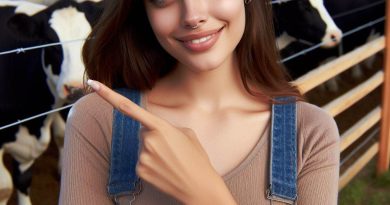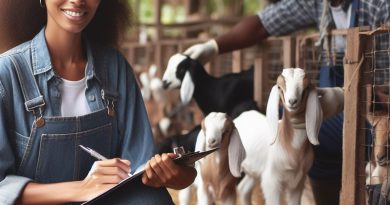Eco Duck Rearing Principles
Last Updated on March 2, 2024
Introduction
In eco duck rearing, sustainability reigns supreme. Harnessing natural practices ensures both ecological balance and a thriving duck farm.
A. Eco Duck Rearing Introduction
- Eco duck rearing prioritizes environmentally-friendly methods for raising ducks.
- Unlike conventional farming, it integrates ecological principles into the entire rearing process.
- This innovative approach strives to harmonize duck farming with nature’s delicate balance.
B. Importance of Sustainable Farming
- Sustainable methods preserve biodiversity and promote the well-being of ecosystems.
- Eco duck rearing minimizes the use of synthetic chemicals, reducing environmental impact.
- By embracing sustainability, farmers contribute to the conservation of natural resources.
- This method promotes soil health, mitigates pollution, and conserves water resources.
- Eco-friendly practices in duck rearing foster resilience in the face of changing environmental conditions.
- Sustainable farming methods benefit not only the environment but also enhance the quality of duck products.
- In essence, eco duck rearing is a holistic approach, harmonizing farming with nature’s intricate dance.
Choosing the Right Breeds for Eco Duck Rearing
Selecting suitable duck breeds is crucial for successful eco duck rearing.
The right breeds should possess adaptability and resilience to thrive in sustainable farming practices.
A. Importance of Selecting Suitable Duck Breeds
Choosing the right duck breeds is essential for several reasons.
Firstly, it ensures the overall success of the eco duck rearing project.
Secondly, suitable breeds adapt well to natural environments, reducing the need for artificial interventions.
Finally, selecting the right breeds contributes to the sustainability of the entire ecosystem.
B. Breeds Known for Adaptability and Resilience
Certain duck breeds are widely recognized for their adaptability and resilience.
These breeds have proven to thrive in various climates and environmental conditions, making them ideal for eco duck rearing.
Here are some notable examples:
- Pekin Duck: Pekin ducks are known for their ability to adapt to different housing systems and climates. They have a rapid growth rate and excellent meat production.
- Rouen Duck: Rouen ducks are highly adaptable and have a calm temperament, making them suitable for both meat and ornamental purposes.
- Khaki Campbell: Khaki Campbell ducks are excellent layers and are known for their adaptability to different weather conditions, making them a popular choice for sustainable egg production.
- Muscovy Duck: Muscovy ducks are known for their ability to feed on insects and pests, making them valuable in natural pest control on the farm.
C. The Benefits of Heritage and Indigenous Breeds
Apart from selecting adaptable breeds, considering heritage and indigenous breeds can bring additional benefits to eco duck rearing.
These breeds have unique genetic traits that have been preserved over the years and offer advantages such as:
- Genetic Diversity: Heritage and indigenous breeds contribute to the overall genetic diversity of duck populations, which is vital for long-term sustainability.
- Disease Resistance: These breeds have developed natural resilience to local diseases and are less prone to common health issues that affect commercial breeds.
- Cultural Significance: Preserving heritage breeds honors cultural traditions and supports local communities by promoting their agricultural heritage.
- Environmental Adaptability: Heritage and indigenous breeds have adapted to specific geographical regions, making them well-suited for eco duck rearing in those areas.
Generally, selecting the right duck breeds plays a significant role in eco duck rearing.
Besides adaptability and resilience, considering heritage and indigenous breeds brings additional benefits to sustainable farming practices.
The choice of breeds contributes to the success and longevity of eco duck rearing projects while supporting genetic diversity and honoring cultural heritage.
Read: Climate-Smart Cattle Farming
Providing a Natural Habitat for Ducks
Creating a natural environment for ducks is crucial for their well-being and overall health.
Here’s why:
A. Creating a natural habitat involves incorporating elements
By creating a natural habitat, we can mimic the conditions that ducks would typically find in the wild.
This promotes their overall well-being and helps them flourish.
- Ponds or water sources: These can be natural or artificial, but they should offer clean water.
- Shelter: Dense shrubs, trees, or artificial structures can provide ducks with a safe place to rest and hide.
- Vegetation: Planting native vegetation around the habitat provides ducks with natural food sources.
- Grassy areas: Ducks like to graze, so having areas with grass and other edible plants is beneficial.
- Nesting spots: Ducks require suitable nesting sites to lay their eggs and raise their young.
B. Access to clean water and natural ponds
- Water is essential for ducks as they use it for drinking, bathing, and even foraging.
- By providing access to clean water sources, we ensure that ducks can maintain their hygiene and stay healthy.
- Natural ponds can also offer a suitable habitat for various aquatic organisms that ducks can feed on.
- It is important to regularly clean and maintain these water sources to prevent the spread of diseases.
C. Ample space for ducks to roam freely
- Ducks are highly adaptable animals that require sufficient space to wander, explore, and exhibit natural behaviors.
- Having ample space helps prevent overcrowding, which can lead to stress, aggression, and health problems.
- When ducks have enough room to roam, they engage in natural activities like foraging, nesting, and socializing.
- Additionally, providing adequate space allows ducks to engage in exercise, promoting their physical fitness.
Ultimately, creating a natural habitat for ducks by providing clean water, ample space, and necessary elements is vital.
Not only does it fulfill their instinctual needs, but it also promotes their physical and mental well-being.
By prioritizing their natural living conditions, we can ensure healthy and thriving duck populations.
Read: Ethical Meat Production Guide
Feeding Ducks in an Eco-Friendly Way
A. Principles of Sustainable Feeding Practices
Feeding ducks in an eco-friendly way is crucial not only for their well-being but also for protecting the environment.
By following sustainable feeding practices, duck rearers can ensure that their birds receive the necessary nutrients without causing harm to the ecosystem.
Sustainable feeding practices involve providing a balanced diet that meets the ducks’ nutritional requirements.
This includes offering a mix of proteins, carbohydrates, fats, vitamins, and minerals.
It is essential to monitor their intake and avoid overfeeding, as excessive food consumption can lead to health issues and environmental pollution caused by the excretion of unused nutrients.
B. Use of Organic and Locally Sourced Feed Options
Choosing organic and locally sourced feed options is another significant step towards eco-friendly duck rearing.
Organic feeds are produced without the use of pesticides, antibiotics, and GMOs, reducing the potential negative impacts on soil, water, and wildlife.
Additionally, sourcing feed locally helps minimize the carbon footprint associated with long-distance transportation while supporting local farmers and promoting sustainable farming practices.
C. Benefits of Incorporating Alternative Feed Sources
Alternative feed sources, such as insects and aquatic plants, also play a vital role in eco-friendly duck rearing.
Insects like mealworms and black soldier flies are natural sources of high-quality protein and can be produced cost-effectively.
Integrating insects into the ducks’ diet reduces the dependence on traditional feed ingredients, which often have higher environmental costs.
Aquatic plants are another valuable feed alternative.
Duckweed and water hyacinth can be grown sustainably in ponds or tanks, providing a nutrient-rich food source for ducks.
Incorporating these plants into the diet not only enhances the ducks’ health but also fosters efficient resource utilization.
The benefits of incorporating alternative feed sources extend beyond the ducks’ well-being.
By diversifying the diet and reducing reliance on conventional feeds, duck rearers can reduce production costs and lower their environmental impact.
This sustainable approach contributes to the conservation of natural resources, protects biodiversity, and fosters the overall sustainability of the duck rearing industry.
In a nutshell, sustainable feeding practices, the use of organic and locally sourced feed options, and the incorporation of alternative feed sources like insects and aquatic plants are essential for eco-friendly duck rearing.
By embracing these principles, duck rearers can ensure the well-being of their birds while promoting a healthier and more sustainable environment.
Read: Sustainable Livestock Feed Ideas

You Might Also Like: GPS Tracking in Livestock Management: Pros & Cons
Managing Waste and Promoting Soil Health
Managing waste is a crucial aspect of duck rearing, as it presents various challenges that need to be addressed effectively.
Implementing proper waste disposal practices is of utmost importance in order to maintain a healthy and sustainable environment for the ducks and surrounding ecosystems.
Additionally, ducks play a significant role in natural fertilization and soil enrichment, further emphasizing the significance of managing waste efficiently.
In this section, we will explore the challenges of waste management in duck rearing, explain the importance of implementing proper waste disposal practices, and highlight the role of ducks in natural fertilization and soil enrichment.
A. Challenges of Waste Management in Duck Rearing
Waste management in the context of duck rearing faces several challenges that need to be addressed in order to maintain a clean and healthy environment.
One major challenge is the excessive amount of waste generated by ducks.
Ducks produce a significant quantity of manure on a daily basis, which, if not managed properly, can lead to pollution of water bodies and emit foul odors that can be disruptive to the surrounding community.
Furthermore, the accumulation of waste can attract pests and potential disease carriers, posing health risks to the ducks and their caretakers.
B. Importance of Implementing Proper Waste Disposal Practices
Implementing proper waste disposal practices is essential for the overall well-being of the ducks and the environment they inhabit.
Firstly, it helps prevent the contamination of water sources, which is crucial for maintaining the health of aquatic ecosystems and preventing the spread of waterborne diseases.
Secondly, proper waste disposal practices reduce foul odors, promoting a pleasant living environment for the ducks and minimizing disturbances to nearby communities.
Lastly, effective waste management can reduce the risk of disease outbreaks by minimizing the attraction of pests and disease carriers.
C. Role of Ducks in Natural Fertilization and Soil Enrichment
Ducks play a vital role in natural fertilization and soil enrichment through their feeding and foraging behaviors.
As ducks roam freely in their rearing area, they consume insects, plants, seeds, and other organic matter.
When they subsequently defecate, their droppings serve as a natural fertilizer rich in nutrients such as nitrogen, phosphorus, and potassium.
These nutrients promote soil fertility and enhance the overall health of the ecosystem.
Additionally, ducks’ foraging behaviors help control weeds, pests, and harmful insects, reducing the need for synthetic pesticides and herbicides.
D. Incorporating Effective Waste Management Practices
To effectively manage waste in duck rearing, there are several practices that can be incorporated.
Firstly, constructing proper waste management systems, such as lagoon systems or biogas digesters, can help collect and process the excessive waste generated by ducks.
These systems not only help contain the waste but also provide additional benefits such as generating renewable energy from biogas.
Secondly, regular cleaning and removal of waste from duck enclosures and resting areas are crucial in maintaining cleanliness and preventing the accumulation of waste.
Furthermore, using the collected waste as organic fertilizer in agricultural fields can greatly benefit soil health and crop productivity.
By incorporating duck manure as a natural fertilizer, chemical inputs can be reduced, promoting sustainable and environmentally friendly farming practices.
Additionally, rotating ducks in different areas allows for effective utilization of their natural fertilization abilities while preventing the over-concentration of waste in a particular location.
Most importantly, managing waste and promoting soil health in duck rearing is essential for maintaining a sustainable environment.
Implementing proper waste disposal practices is crucial to overcome challenges such as excessive waste generation and pollution.
Ducks contribute significantly to natural fertilization and soil enrichment, highlighting their importance in sustainable agriculture.
By incorporating effective waste management practices, we can ensure a clean and healthy environment for both ducks and surrounding ecosystems, while also utilizing their waste as valuable organic fertilizer.
Read: Eco-Friendly Livestock Shelters
Utilizing Renewable Energy and Efficient Technologies
A. Showcase the advantages of utilizing renewable energy sources
Utilizing renewable energy sources in duck rearing operations has numerous advantages.
By reducing reliance on non-renewable energy, it helps to protect the environment and reduce greenhouse gas emissions.
Utilizing renewable energy sources and incorporating energy-efficient technologies can also attract customers and stakeholders who value sustainable practices.
Consumers are becoming increasingly conscious of environmental issues and are more inclined to support businesses that prioritize sustainable solutions.
B. The potential of solar or wind power for duck rearing operations
Solar power is a highly promising renewable energy source for duck rearing operations.
Installing solar panels can provide a consistent and reliable source of electricity for various farm activities, such as heating water, powering ventilation systems, and operating electronic equipment.
Wind power also has great potential for duck rearing operations, especially in areas with consistent wind patterns.
Wind turbines can generate electricity to power various farm operations, supplementing or even replacing traditional energy sources.
C. The benefits of incorporating energy-efficient technologies in the farm
By incorporating energy-efficient technologies in the duck farm, significant benefits can be realized.
Energy-efficient lighting systems, such as LED lights, can save electricity and reduce operating costs.
These lights also have a longer lifespan, reducing the need for frequent replacement.
The use of energy-efficient heating and cooling systems, such as heat pumps, can provide a comfortable environment for ducks while minimizing energy consumption.
These systems are highly efficient in converting energy to heat or cool air, resulting in cost savings.
Efficient water management technologies, such as automated irrigation systems, can ensure optimal water usage and reduce waste.
By monitoring soil moisture levels and weather conditions, these systems can deliver precise amounts of water to the duck farm, avoiding water overuse or shortage.
Implementing energy-efficient ventilation systems is crucial in maintaining good air quality in the duck farm.
These systems can effectively remove foul odors and harmful gases, ensuring a healthy environment for the ducks.
Additionally, energy-efficient ventilation reduces energy consumption and operating costs.
Furthermore, embracing renewable energy and efficient technologies can contribute to long-term cost savings.
While the initial investment may be higher, the reduction in energy expenses can lead to significant financial benefits over time.
Additionally, renewable energy systems may be eligible for government incentives or grants, further offsetting the costs.
In essence, utilizing renewable energy sources such as solar power and wind power, along with incorporating energy-efficient technologies, can bring numerous advantages to duck rearing operations.
From environmental benefits and cost savings to attracting environmentally-conscious customers, these sustainable practices can help create a more efficient and sustainable industry.
Conclusion
Eco duck rearing principles emphasize sustainable farming methods that benefit both the environment and the farmers.
By following these principles and practices, farmers can improve the health and well-being of their ducks, as well as protect natural resources.
Implementing eco-friendly techniques in duck rearing has a positive impact on the environment.
It reduces the use of harmful chemicals, minimizes pollution, and preserves biodiversity.
These practices also contribute to the production of healthy and high-quality meat and eggs.
Considering the rising concern for sustainability, it is important for farmers to explore and adopt eco-friendly techniques in duck rearing.
This can be done by using organic feed, practicing rotational grazing, providing clean and natural water sources, and implementing proper waste management.
By embracing eco duck rearing principles, farmers can contribute to the conservation of natural resources, reduce carbon emissions, and create a more sustainable future for agriculture.
Not only will this benefit the farmers themselves, but also the consumers who seek ethically produced food.
So, let’s take a step towards sustainable farming methods and start implementing eco-friendly techniques in duck rearing.
Together, we can make a difference in the way we produce food and ensure a healthier planet for future generations.


